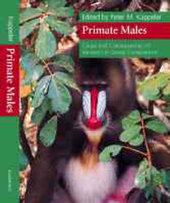
|
Primate Males: Causes and Consequences of Variation in Group Composition
Hardback
Main Details
| Title |
Primate Males: Causes and Consequences of Variation in Group Composition
|
| Authors and Contributors |
Edited by Peter M. Kappeler
|
| Physical Properties |
| Format:Hardback | | Pages:328 | | Dimensions(mm): Height 255,Width 194 |
|
| Category/Genre | Animal behaviour
Primates |
|---|
| ISBN/Barcode |
9780521651196
|
| Classifications | Dewey:599.8156 |
|---|
| Audience | | Professional & Vocational | |
|---|
| Illustrations |
43 Tables, unspecified; 74 Line drawings, unspecified
|
|
Publishing Details |
| Publisher |
Cambridge University Press
|
| Imprint |
Cambridge University Press
|
| Publication Date |
4 May 2000 |
| Publication Country |
United Kingdom
|
Description
The size and composition of primate groups varies tremendously across species, within species, and within groups over time. The most variable quantity is the number of adult males. In some groups, single males can monopolize access to several females, whereas reproduction is shared among several males in other groups. This variation lies at the heart of understanding adaptive variation among social systems. Whether groups contain single or multiple males has important consequences for reproductive strategies of both sexes, and also shapes these animals' morphology and behaviour. Written by leading authorities, this book provides an extensive overview of variation in group composition across all major primate taxa, using up-to-date reviews, case studies, evolutionary theory and theoretical models, setting primates into context with birds and other mammals. It will become a firm favorite with all those interested in the behavioural ecology of primates.
Reviews"This technical compendium will generate much debate in seminars and journals during the coming decade. Recommended for anthropological and zoological collections." Choice
|